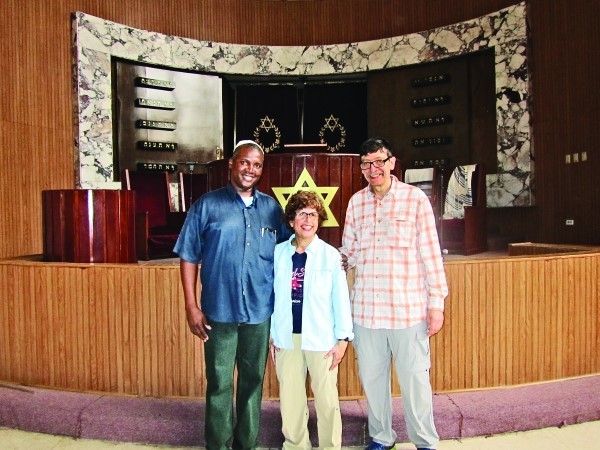Another look at Cuba
After reading the stories about the Alliance mission to Cuba and M. Charles Bakst’s trip to Cuba, in the Oct. 14 edition of The Jewish Voice, we wanted to provide our story about our recent trip to Cuba. My wife, Lynne Glickman, and I traveled to Cuba from Sept. 26 to Oct. 3. We were on a baseball-inspired tour called “Cuba Ball.” Both of us are members of the Society for American Baseball Research. I’ve always had an interest in visiting Cuba especially to see baseball.
We also knew that we wanted to connect with some part of the Jewish community in Cuba. On our first afternoon, we headed to Temple Beth Shalom. Adela Dworin, whom M. Charles Bakst mentioned in his article, warmly greeted us. Along with other tourists from the United States, Israel and Peru, we were given an interesting tour of the sanctuary. While we were there, Dworin invited us to Erev Rosh Hashanah services and a community dinner afterward. Interestingly, she was stymied in her efforts to get apples for the dinner.
M. Charles Bakst is correct when he says that Dworin has a Ph.D. in “schnorring” when it comes to getting any sort of financial aid for the synagogue and Jewish community as a whole. She was delightful and pleasant and cares greatly about the Cuban Jewish community. The gentleman who provided the tour mentioned the Rhode Island mission to us.
We did attend Erev Rosh Hashanah services on Oct. 2. We were moved by the service that was run by the teenagers and young adults of the community. The service was conducted in both Spanish and Hebrew, and the prayer book, from Argentina, was written in Spanish and Hebrew. The language barrier didn’t matter as we were happy to be experiencing Rosh Hashanah in Cuba.
About 100 people attended the service. Approximately one-half were Cubans. The rest were from the United States and other countries.
While we thought that the tour would focus on baseball, we began to understand what it was like to visit a communist country. There is no advertising in Cuba. The billboards that exist display pictures of Fidel and/or Raul Castro and sometimes Che Guevera. Public health messages are also displayed.
There is rationing of food. However, apparently Jews can get chicken for Shabbat and holidays without having to get it through the rationing process.
The baseball we saw is on par with minor league, AA, ball as most of the top players have moved to the major leagues, Canada and Japan. The stadiums that we visited were built mostly in the 1940s. They ranged in quality from a Little-League park to a large minor-league stadium.
The government allows family-owned restaurants, referred to as paladars. We ate in a number of them. The food that was served was large in portion, so much so that Lynne and I decided to share entrees. We found the food excellently prepared. We were actually hard-pressed to find beans and rice. On our first night, we ate at San Cristobal, the same paladar where President Barack and Michelle Obama ate when they visited Cuba in late March. Also, they attended a baseball game between the Tampa Bay Rays and the Cuban National team in Havana.
Cubans, who seem happy, get free health care, and children participate in an excellent educational system. Petty crime is the only crime that seems to exist. Firearms are illegal. It is safe to walk the streets day and night. Many American automobiles from the 1950s serve as taxis. We also saw some nurses in white uniforms complete with hats, reminiscent of the 1950s in the U.S.
While there, we had no cellphone or internet connectivity. There is some limited internet capability in the hotels. For Cuban citizens there are hot spots in Havana where they can go to use cellphones and tablets to access the internet and make calls. We saw people on the street where we could tell they were using a camera to be seen and to see the remote person. It was exciting to watch.
When we informed people in the service industry that were on a baseball tour, every one of them said that they wanted to travel, especially to the states. They were disappointed that they did not have the ability to travel to see Derek Jeter or David Ortiz play, in person.
The trip afforded us the opportunity to see a country that is very different from our own, from the lack of advertising, to the rationing of food and free health care – in many ways a time warp to the 1950s. However, we did find common ground in the people and players who love to watch and play baseball as well as with the Jewish community of Havana.
MARK KANTER and LYNNE GLICKMAN live in Portsmouth.








